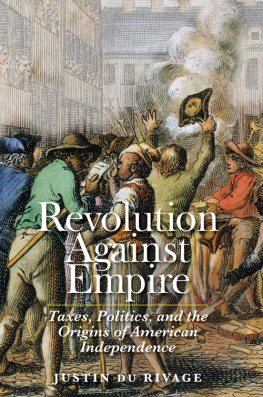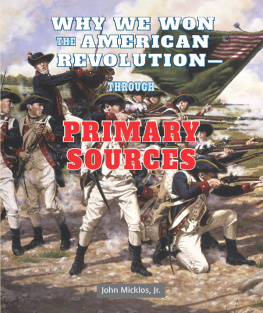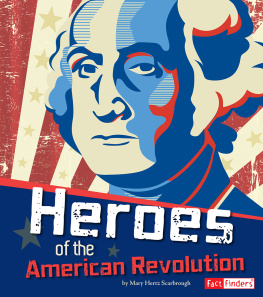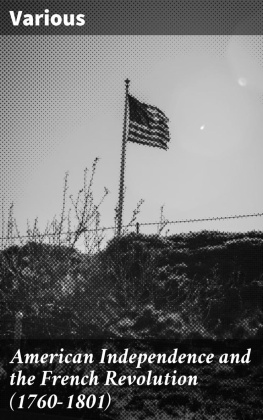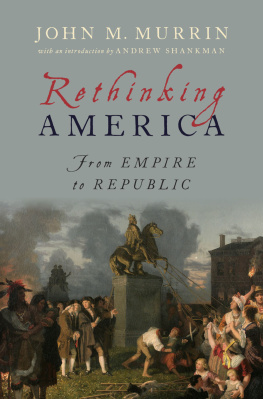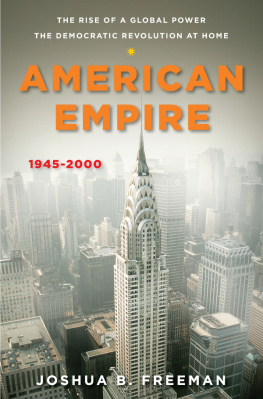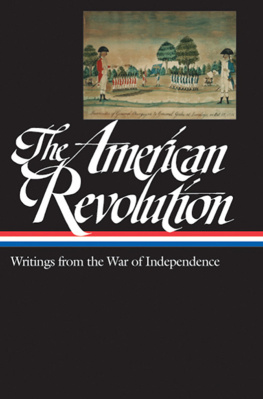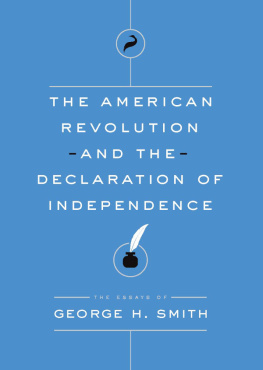Du Rivage - Revolution Against Empire: Taxes, Politics, and the Origins of American Independence
Here you can read online Du Rivage - Revolution Against Empire: Taxes, Politics, and the Origins of American Independence full text of the book (entire story) in english for free. Download pdf and epub, get meaning, cover and reviews about this ebook. City: New Haven;CT, year: 2018;2017, publisher: Yale University Press, genre: Politics. Description of the work, (preface) as well as reviews are available. Best literature library LitArk.com created for fans of good reading and offers a wide selection of genres:
Romance novel
Science fiction
Adventure
Detective
Science
History
Home and family
Prose
Art
Politics
Computer
Non-fiction
Religion
Business
Children
Humor
Choose a favorite category and find really read worthwhile books. Enjoy immersion in the world of imagination, feel the emotions of the characters or learn something new for yourself, make an fascinating discovery.
Revolution Against Empire: Taxes, Politics, and the Origins of American Independence: summary, description and annotation
We offer to read an annotation, description, summary or preface (depends on what the author of the book "Revolution Against Empire: Taxes, Politics, and the Origins of American Independence" wrote himself). If you haven't found the necessary information about the book — write in the comments, we will try to find it.
Du Rivage: author's other books
Who wrote Revolution Against Empire: Taxes, Politics, and the Origins of American Independence? Find out the surname, the name of the author of the book and a list of all author's works by series.
Revolution Against Empire: Taxes, Politics, and the Origins of American Independence — read online for free the complete book (whole text) full work
Below is the text of the book, divided by pages. System saving the place of the last page read, allows you to conveniently read the book "Revolution Against Empire: Taxes, Politics, and the Origins of American Independence" online for free, without having to search again every time where you left off. Put a bookmark, and you can go to the page where you finished reading at any time.
Font size:
Interval:
Bookmark:
Revolution Against Empire

THE LEWIS WALPOLE SERIES
IN EIGHTEENTH-CENTURY CULTURE AND HISTORY
The Lewis Walpole Series, published by Yale University
Press with the aid of the Annie Burr Lewis Fund, is dedicated
to the culture and history of the long eighteenth century (from
the Glorious Revolution to the accession of Queen Victoria). It
welcomes work in a variety of fields, including literature and
history, the visual arts, political philosophy, music, legal history,
and the history of science. In addition to original scholarly work,
the series publishes new editions and translations of writing from
the period, as well as reprints of major books that are currently
unavailable. Though the majority of books in the series will
probably concentrate on Great Britain and the Continent, the
range of our geographical interests is as wide as
Horace Walpoles.

Published with assistance from the income of the Frederick John Kingsbury
Memorial Fund, and from the Annie Burr Lewis Fund.
Copyright 2017 by Justin du Rivage.
All rights reserved.
This book may not be reproduced, in whole or in part, including illustrations, in any form (beyond that copying permitted by Sections 107 and 108 of the U.S. Copyright Law and except by reviewers for the public press), without written permission from the publishers.
Yale University Press books may be purchased in quantity for educational, business, or promotional use.
For information, please e-mail (U.K. office).
Set in Fournier type by IDS Infotech, Ltd.
Printed in the United States of America.
ISBN 978-0-300-21424-6
A catalogue record for this book is available from the Library of Congress, and also from the British Library.
This paper meets the requirements of ANSI/NISO Z39.48-1992 (Permanence of Paper).
10 9 8 7 6 5 4 3 2 1
For Amanda
Contents
Acknowledgments
It is a great pleasure to thank all of those who have helped bring this project to fruition. Revolution Against Empire simply would not exist without the advice, criticism, and support of a great many people and institutions. Indeed, the words that follow cannot possibly repay the debts that I have incurred.
Yale was an exceptionally rewarding place to research both a dissertation and a book that crosses geographic and disciplinary boundaries. I was particularly fortunate to have advisors whose interests were as expansive as their intellectual generosity. Steve Pincus taught me to keep asking, Why? while Joanne Freeman showed me how recovering fears and passions can help us answer the big questions of political history. Holly Brewer and Julian Hoppit both helped guide the dissertation on which this book is based, while Claire Priest showed me how important legal institutions are for understanding the origins of the American Revolution. James Vaughn taught me just how important conservatism was in shaping the politics of the eighteenth-century British Empire. Conversations with Julia Adams, Jon Butler, John Demos, Paul Kennedy, Naomi Lamoreaux, Ed Rugemer, Keith Wrightson, and Charles Walton likewise shaped the way I think about the past. All of you have made me a better thinker and a better historian.
In many ways, Revolution Against Empire began even before I arrived in New Haven. The faculty of the Pomona College History Department, particularly Ron Cluett, Gary Kates, Helena Wall, and Sam Yamashita, taught me how history can help make sense of the world we inhabit. At Cambridge, Mike Sonenscher and Istvan Hont introduced me to the myriad ways in which eighteenth-century political economy can shed light on enduring problems of inequality, government, and international relations. Together, these scholars and mentors have given me a compelling sense of why history matters.
The story that follows is the product of years of searching for documents on both sides of the Atlantic, a task that would have been impossible without the generosity of librarians, archivists, and institutions. The Beinecke Rare Book and Manuscript Library, the Lewis Walpole Library, the Huntington Library, the American Philosophical Society, and the Clements Library all offered their exceptional collections as well as their financial support to make this book a reality. Essential though these resources were, I would have been lost without the keen advice of Greg Eow, Kathryn James, Olga Tsapina, and countless other librarians and curators. Moreover, the Smith Richardson Foundation, Yale International Security Studies, the Leitner Program in International Political Economy, the Macmillan Center for International and Area Studies, the Fox International Fellowship, and the Stanford History Department all offered invaluable financial assistance to make my many research expeditions possible.
I could not be more grateful for the encouragement and advice that I received as I transformed my Ph.D. dissertation into this book. At Stanford, Caroline Winterer was both a keen critic and exceptionally generous with her vast knowledge of the Enlightenment. Nancy Kollmann and Ali Yaycioglu broadened my intellectual horizons by welcoming me into their seminar on Eurasian empires. Jennifer Burns, Jim Campbell, David Como, Paula Findlen, Ana Minian, Jack Rakove, Jessica Riskin, Richard White, Kren Wigen, and Gavin Wright all made my time in Palo Alto as enjoyable as it was productive. At Yale University Press, my editor Erica Hanson saw the potential of this project from the very beginning and worked tirelessly to improve it, while Phillip King and Andrew Frisardi did a brilliant job of transforming the manuscript into a finished product. William Ashworth shared his knowledge of eighteenth-century taxation with me while Peter Onuf and George William Van Cleve offered suggestions that greatly improved both and the conclusion. Thank you all.
Colleagues and friends at Yale, Stanford, and around the world read chapters, offered guidance, and shared their knowledge with me. Lucy Kaufman provided her keen editorial eye with unstinting generosity and good humor. Richard Huzzey and Christian Burset read the manuscript and rescued me from a great many errors. David Lydon, my sister Nathalie, and my parents Kent and Franoise all gave me phenomenal advice for how to make a book about eighteenth-century taxation accessible to a wide audience. Thank you as well to Catherine Arnold, Teresa Bejan, Michael Blaakman, Bill Bullman, William Derringer, Chris Desan, Amy Dunagin, Allison Gorsuch, Penny Green, Andy Hammann, Michael Hattem, Elizabeth Herman, Todd Holmes, Tom Hopkins, Tony Hopkins, Robert Ingram, Sarah Kinkel, Megan Lindsay, Jim Livesey, Matt Lockwood, Noah Millstone, Lindsay ONeil, Ken Owen, Mark Peterson, Allyssa Reichhardt, Sophus Reinert, John Shovlin, Phil Stern, Leslie Theibert, Matthew Underwood, Heather Welland, Jennifer Wellington, Carl Wennerlind, Nick Hoover Wilson, Alice Wolfram, and Nick Wrightson. Our conversations have been at times thoughtful and profound, at others blithe and frivolous, but they have brightened my life and made this a far better book.
Finally, and most of all, I thank Amanda Behm. She offered not only her invaluable counsel, but repaid my writerly obsessions and neuroses with love and grace. Having her in my life has been my greatest joy.
Key Figures
These names are organized by ideological group to help guide the reader through the debates that follow. Keep in mind, however, that eighteenth-century opinion existed on a continuum, and people often changed their political stripes.
Next pageFont size:
Interval:
Bookmark:
Similar books «Revolution Against Empire: Taxes, Politics, and the Origins of American Independence»
Look at similar books to Revolution Against Empire: Taxes, Politics, and the Origins of American Independence. We have selected literature similar in name and meaning in the hope of providing readers with more options to find new, interesting, not yet read works.
Discussion, reviews of the book Revolution Against Empire: Taxes, Politics, and the Origins of American Independence and just readers' own opinions. Leave your comments, write what you think about the work, its meaning or the main characters. Specify what exactly you liked and what you didn't like, and why you think so.

